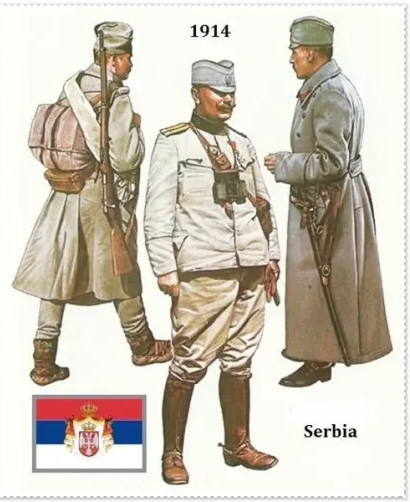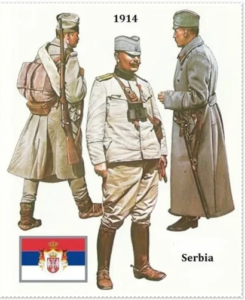by Bill Holloway
 “Nemari ništa”, Serbian for ‘it matters nothing’ – and maybe better rendered as “no worries” in Australian – was the constant refrain of Serbian guards and patients, soon picked up by the women, sestres, of the staff at the field hospital behind Serbian lines where Miles Franklin volunteered for six months during WWI.
“Nemari ništa”, Serbian for ‘it matters nothing’ – and maybe better rendered as “no worries” in Australian – was the constant refrain of Serbian guards and patients, soon picked up by the women, sestres, of the staff at the field hospital behind Serbian lines where Miles Franklin volunteered for six months during WWI.
Franklin served with Scottish Women’s Hospitals from July 1917 to February 1918, at the ‘American’ unit (funded by donations from America) at Ostrovo in Serb-held Macedonia, inland of Salonika (now, respectively, Lake Vegoritida and Thessaloniki, in Greece).
Nemari ništa is an unpublished, 108pp manuscript of her time there, held in the Mitchell (Library of NSW) and very difficult to find online. Franklin says, on signing up:
We affixed our signatures to a cold-blooded document stating that we undertook this work at our own risk and could have no claims if damaged, swore that we would take no cameras and associate with newspaper men. I deplore my hampering home training which made me take this last vow seriously as I found that few others did, not even those whom I should without hesitation have pronounced quite “nice”.
which probably explains why she didn’t look for a publisher at the time, but not why neither she nor anyone else has never collected and published this and all her other considerable war-time writings.
In searching for the text of Nemari ništa I came up with an essay by Professor Millicent Vladiv-Glover, of Monash Uni, titled ‘An Unknown Australian War Novel: Miles Franklin’s Nemari ništa: Six Months with the Serbs‘, whose contention is that Nemari ništa should be read as a novel:
… Franklin [is] an Australian writer of “the soil” whose observations of the Serbian soldiers and life in the hospital camp on the Salonica front take the form of sketches of manners. The sketch of manners is announced in the literary manifestoes of the French, the English and the Russians as part of a poetics of Realism in the European literary canon. These prescribe the capturing of a moment in time as the task of the writer, who acts as a ‘local historian’ perpetuating the memory of manner and mores of his contemporaries for posterity.[…] It is the personalized emotive point of view, described as “Australianism” which imparts unity to the sketches and gives grounds for calling Six Months with the Serbs an Australian war novel.
My own opinion is that if it were ever to be published it would be read as memoir. Vladiv-Glover goes on to describe why Franklin, like Dostoyevsky, is a ‘writer of the soil’, and then to a really interesting re-definition of Realism and its relation to Modernism.
Miles Franklin’s Six Months with the Serbs looks – with uncanny resemblance – like a response to the call of Jules Janin’s manifesto of Realism in Les français and Baudelaire’s aesthetics of history (of 1865).
Enough theory! Nemari ništa consists of twelve ‘sketches’, or eleven really, XII being just a brief farewell; plus two introductory chapters – ‘Getting There’ and ‘There’.
When we discuss Miles Franklin we sometimes forget just how ‘British’ she was, just how British Australia was up and into the 1950s. In the very first section, headed, In the service of the empire, she writes:
The siren bugle call of England ringing round the world in 1914 A.D. to rally her children to her was heard with equal clarity by those a-near and those a-far,
I have always credited Franklin with taking an anti-war position, and her writings both up to 1915 and after the War, support that; but she disparages here “those so faithful to discredited ideals of love and brotherhood”; and gives the distinct impression throughout Nemari ništa of supporting the aims of the British, both in the War and in maintaining the Empire. Clearly. living in London from mid 1915 to mid 1917, with the guns of war echoing across the Channel, had led her to taking sides.
Those first two chapters describe her enlistment and her voyage out, across the Channel – “There was certainly no adventure in the run to the censored port of embarkation, but only regret to leave that lovely England, the lodestar of every Britisher, Outlander or Homelander.” She of course is an ‘Outlander’ but undeniably still British. I don’t know where the front lines were at that time, but I’m guessing she came south from Southampton to Le Havre and then by rail to Rouen and Paris (which she names). She had been to Paris once before the War and not liked it. This time I think she is bouyed up by excitement and camaraderie. Within a day they were on their way, through southern France, over the Alps and into Italy
We did not know the route. Sometimes the train lights shone on factories and anon on boats and rigging, and we believe we missed the leaning tower in the darkness. Morning found us on flat lands amid the olive and almond groves …
A brief stop in Rome and then south and east to Taranto, where they boarded the “SS Blank” (more censorship) and sailed, escorted by two Japanese destroyers, through the Greek Islands, “halting at Corfu, Navarino Bay and the harbour of Melos” and so up the east coast of Greece to Salonika (map). There she is picked up by the Officer Commanding the SWH Ostrovo unit, Australian Dr Agnes Bennett, in her Ford ‘Tin Lizzie’ and driven by a ‘shover’ (chauffeur) “along the famous high way to Monastir, where we had been preceded by Alexander the Great” and up into the hills in the night.
In the morning “the little camp was pretty as a picture. Its white tents, sheltering a community of over three hundred souls, nestled among the near hills in a sheltered basin under some aged and shady elms” and in the distance a range which brings to her mind the Bogongs (in north eastern Victoria), topped by majestic Mount ‘Kaimacktchalan’. (throughout, her spelling of Serbian words is generally phonetic).
Miles Franklin here is in her late 30s. All her life she enjoyed the company of men, and at the same time expected them to respect her boundaries. And as far as I know, they always did. Here, on a ship, three women with 3,000 soldiers, or at Ostrovo, a score or so of women amongst 300, she is absolutely certain of her safety.
The women, on their free days and half days, hitch hike around the countryside, in pairs, with whichever vehicle of whichever army will pick them up (Only British officers refuse). At nights they are assigned Serbian guards, whom Franklin trusts implicitly.
Franklin clearly loved the Serbs, probably all the staff, orderlies, nurses and doctors, did. Men are forever being pulled out of work details, and convalescent patients out of their beds, to give Serbian language classes. The other thing that Franklin loves is the freedom of ‘short’ skirts. I think she means mid-calf.
I went to bed the first night filled with enthusiasm to speak Serb and learn more of such winning gentlemen. For the rest we were all occupied with the mosquito problem. We were supplied with good nets but in a narrow stretcher it was impossible to outwit the rapacious insects, which during my sojourn in the Balkans, were much more deadly than the Bulgars.
The ‘mosquito problem’ led inexorably to malaria by which everyone was brought down eventually, and for some time after her return to England (outside the scope of these sketches) Franklin was quite ill.
I’m sure lots of work was done, but there were other hospitals closer to the front lines and Ostrovo was mainly convalescent. Franklin makes it sound like one long holiday –
Lake Ostrovo was a glorious swimming hole, sloping in so gradually at our end that it was safe for beginners, only we hated the snakes reputed to be poisonous. The Serbs provided us with a big plank to float on as well as a mia-mia of boughs to dress in. What swims we had there quite undeterred by the assertion, false or otherwise, that the lake was full of dead Bulgars from Kaimacktchalan and other fights, and that to bathe there promoted malaria! The Macedonians from a distance must often have been intrigued to see a pair of braw Scottish lassies with flying hair dancing a spirited reel on the shore in their bathing tights.
At some stage Franklin was promoted to Matron Nye’s “Man Friday”.
Some orderlies rank as valets, but in our democratic personnel they were like aides-de-camp to their chiefs. I was matron’s galloper. […] This was the most delightful post in the whole establishment. Under Matron’s supervision I looked after the linen and all the clothing and bedding supplies and gave out the dressings. This latter was jolly as it brought me in contact with the sisters and they made me free of the wards so that I met every patient in the place. On Sunday, mine was the felicity of distributing the tobacco. I cavorted all over the camp on errands for Matron and had outlet for my social tendencies.
Throughout the sketches she introduces us to individual Serbs, describing them and their situations in some detail. In the retreat from Serbia (they were overrun by Bulgaria) all of the men had left families behind, women and children of whom they had had no word for a year or more, amid terrible rumours of young women being rounded up for ‘war work’
And of course, as each man is brought back to health he is then packed off back to the front. (see last Friday’s extract, ‘The Plight of the Serb’), often in the torn and bloodied clothes he was wearing when he was brought in.
This is the last time in her life that Franklin wrote about herself, fictionally or otherwise. She led an interesting and varied life and it is a shame that she never wrote a comprehensive memoir. It is an even greater shame that Nemari ništa has never been published.
.
Miles FranklinNemari ništa: Six Months with the SerbsUnpublished, 1918108pp
see also:Millicent Vladiv-Glover, An Unknown Australian War Novel, Monash Uni., 2014. (here)
Professor Vladiv-Glover writes “Nemari ništa: Six Months with the Serbs […] is published only today, on the 100th Anniversary of World War One [ie. in 2014], by the American Slavic publisher, Charles Schlacks (Idyllwild, CA), in conjunction with Plenum Online Publishing (Australia)”. But I can’t locate it..
Bill Holloway, the author of this review, blogs at The Australian Legend. He is an old white guy the subject of whose (very) mature age M.Litt thesis was ‘The Independent Woman in Australian Literature’.







Loved this insight into this rare part of miles franklins story and life. Would love to read more now. Thx for the lovely review – you’ve enticed my mind!
There’s one more piece by MF on Friday.
Elizabeth (below) is the editor in charge of selecting stories. We’ll have to find an excuse to get her to run some more of MF’s war journalism in the future (MF will be 135 next year, will that do?)
Always happy for suggestions!
Having just read Friday’s extract, I find this illuminating. I think you’re right, Bill. It deserves to be published.
I like the quoted reference to writers being ‘local historians’, capturing for future generations contemporary manners and mores. So many of the writers I’ve been looking at don’t have that eye for detail – and ear for speech – that MF’s work displays. It’s what makes her account so memorable.
MF was nearly always a better descriptive writer than story teller; and this ‘colour-piece’ work probably plays to her strengths.
It beggars belief that she didn’t write a war memoir/novel in the early 1920s. Instead she got a bee in her bonnet about writing a Mayfair novel or a spoof on Mayfair novels. What a waste!
I’m sure there’s a story in that! What was the title of her Mayfair story spoof?
Bring the Monkey, which isn’t all bad, followed by Prelude to Waking (by Brent of Bin Bin) which very nearly is. Both written in the 1920s though Prelude wasn’t published till later when MF insisted it be the fourth or fifth Brent of Bin Bin
Surely SUP or MUP (Miegunyah Press ) could consider publishing this. Why on earth wouldn’t they? It would need a different title OR something like “Nemari ništa, or No worries: Miles Franklin and World War 1”.
Thanks for this Bill. Such an interesting sounding work.
BTW I think a post on how you discovered the existence of this work and how you tracked down a copy to read would be great.
Excellent Bill … that would be a great idea … actually I mean the ANZAC Day post but one on Vladiv-Glover’s paper would be good too.
I wonder what the costs would be of self-publishing, if that’s the right term for publishing someone else’s work? Who has literary ownership of Miles’s work … though September 1924 will be 70 years so it will be out of copyright (do they do from death date or just the year of death?
Miles died during the 50 year period for copyright – which I think was backdated to 1956 when the Americans forced us to accept 70 years. I paid for my copy, as much as an expensive hardback, to an academic site, perhaps to cover the costs of converting to pdf, perhaps because they could.
Yes, she did … but at that time copyright in unpublished ms was perpetual. It has only recently been brought into line with other works but 70 years from death of creator for unpublished versus 70 years from first publication for published.
Your academic site is like most cultural institutions… they charge for provision of materials. Usually cost recovery but it can depend on the situation.
Live & learn!
We do! Copyright – though not so much literary works – was a big issue throughout my career. I’m a bit behind now but take a bit of an interest.